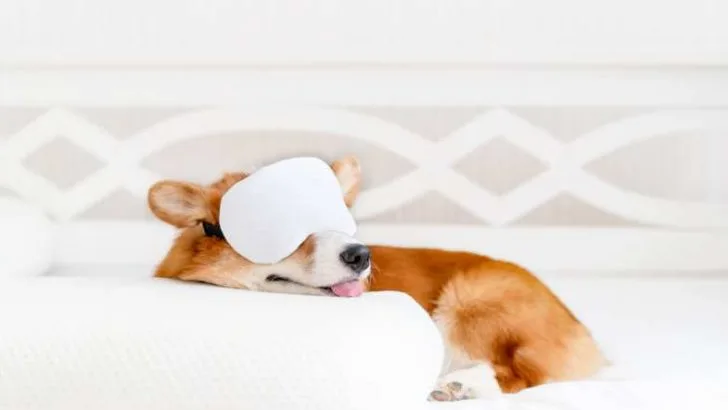Recently you’ve become a dog parent to a cute, fluffy Corgi pup. You’ve wanted a Corgi puppy for a long time now, not just because you like their looks but because you learned they have unique personalities.
All that aside, you’ve noticed something immediately after you brought your newborn puppy home – it seems lethargic and inactive most of the time. Also, it sleeps throughout the entire day!
Now, no one ever mentioned this to you, and you didn’t stumble upon such information while you read about Corgis in the past. Naturally, you’re starting to get worried that something might be wrong with your pup – perhaps it lacks some minerals and vitamins?
However, we assure you – your Corgi puppy is more than fine! Corgis sleep a lot during this transitional period. What’s more, even adult Corgis spend most of the day sleeping.
But why do Corgis sleep so much? How long do Corgis sleep? We are here to answer all of your questions, so without any further ado, let’s get going!

Why Do Corgis Sleep So Much?
Corgi puppies grow very fast, and they will be fully grown after just one year.
Same as a human baby, they also need to sleep a lot to support the growth period. And when we say “growth period,” we don’t just mean body growth – but mental development, too.
Why?
Sleep will help your Corgi puppy integrate what it has learned and seen that day. What’s more, it helps its body grow, and also tones and strengthens bones and muscles.
Your puppy must get enough sleep; that’s crucial. Otherwise, it could suffer various physical and mental consequences.
If your puppy sleeps just a few hours a day, it will become very tired, and that could lead to behavioral problems. Moreover, it can affect your puppy’s health and overall development.
Do Corgis Sleep A Lot?
Yes, they do! Corgi puppies will sleep from 18 to more than 20 hours a day. After they’re fully grown up, they will still sleep more than 15 hours a day.
And what about when they’re awake?
Well, if they’re not sleeping the day away, you can expect them to be very energetic, curious, playful, and constantly running around the house.

How Much Sleep Do Corgis Need?
During the daytime, it’s normal for your Corgi puppy to sleep anywhere between 30 minutes to two to three hours per nap. Of course, some days, your pup will sleep even more.
However, at night, your Corgi should sleep from 6 to 10 hours. If your puppy is between one to three months old, it’ll require potty breaks more than once during the night.
But if your pup is whining in its crate during the nighttime, don’t give in – it has to learn when it’s sleep time.
Here’s a tip: If you don’t want your puppy to wake you up constantly during the night, make sure he has gone to the potty and is well exercised.
How Often Do Corgis Sleep?
It is perfectly normal for a pup to wake up several times a day to chew on its toys – and your fingers – and perhaps run around for a while, then fall asleep in its crate again.
But sometimes, your Corgi puppy might want to play all day long. However, you shouldn’t let your pup get over simulated.
Here’s what we mean:
If you see your puppy is tired but doesn’t go to sleep, direct it to its crate and pet it to sleep. Calming voice, cozy blankets, and a dark and quiet room will help your pup fall asleep faster and won’t disturb it while sleeping.
Once your puppy is awake, make sure to go outside or for a short walk so he can go pee or poop. You can also play with your pup and use this time for some training – give it treats and teach your dog to sit down on command, for example.
After you go inside, it’ll probably sniff around and fall asleep very quickly.
Napping In The Crate
If you want to crate train your Corgi puppy so it can think of it as a safe place, give your dog its meals inside the crate. Also, encourage it to always take its naps in it.
That also helps create some boundaries that can be essential in the long run.

When Should You Be Worried?
Let’s say you brought your Corgi puppy more than two weeks ago; you see that it’s sleeping between 18-20 hours a day – but is still tired.
If that’s the case, you should visit your veterinarian.
Even though some dogs are lazier than others, you’ll probably have to try different toys in the first couple of days to find the ones that will catch your puppy’s attention.
But if it seems depressed, lacking energy all of the time, or doesn’t want to eat, then it’s time to make a trip to your vet.
Here are some of the reasons why your Corgi puppy lacks energy:
- Pain
- Poisoning
- Anemia
- Parasites
- Different medications
- Infection
- Illness
- Lacking nutrients
- Incomplete diet
- Dehydrated

How Much Do Adult And Senior Corgis Sleep?
Corgis are a herding breed, and they love to be active almost all of the daytime. Because they are a very energetic and playful breed, they tend to burn out of energy fast – and need more sleep.
Adult Corgis will sleep between 12 to 16 hours a day in a 24-hour period.
Some researchers even found out that middle-aged and old Corgis sleep more than young adult Corgis.
That’s because they run out of energy and need to sleep more often than younger dogs. However, this also doesn’t mean that they took longer naps; they only did it more often.
Moreover, older and middle-aged dogs tend to sleep more at night than younger dogs, and they don’t wake up that often during the night.
That can also differ as every Corgi is unique.
The sleeping patterns depend on multiple factors, such as the temperament and personality of your pup, your lifestyle, and the overall atmosphere in your home.
If you’re inactive and like to lay around more, your Corgi will probably be like that, too – and vice versa.
As for senior Corgis (seven years or older), they’ll typically sleep from 14 to 16 hours a day.
And as they age more (10 to 15 years), they tend to sleep more than 18 hours a day, just like puppies. That’s because they tend to slow down and don’t have as much energy as younger Corgis do.
Also, in senior Corgis, sleep patterns could change over time. They’ll usually take more naps during the daytime and wake up more often during the night.
That significant change is often introduced slowly, so you shouldn’t be worried about your Corgi’s health. However, if it happens suddenly, you should consult with your veterinarian.
A sudden change in sleep patterns could be a sign of health issues such as:
- Arthritis
- Dementia
- Hypothyroidism
Moreover, your senior Corgi might also wake up more during the night because its bladder has weakened, and it needs to use the potty more often. In those cases, you can help your dog by taking it out before sleep time – and limiting the water intake before bed, too.
Lastly, if you wondered are Corgis nocturnal, don’t worry; they are not. Your Corgi will go to sleep at the same time as you do because Corgis are social sleepers.
An adult Corgi will most probably sleep through the entire night without waking up. Older and newborn Corgis are more prone to a few wakeful periods at night.

Corgi Sleeping Positions
Have you ever wondered how do Corgis sleep? It’s time to find out some of their most famous sleeping positions!
1. Curled Up
Corgis, like other dogs, like to sleep curled up in a ball. This position is an instinct because it kept them warm and protected their vital organs back in their “wild” days.
2. On The Back
If your Corgi sleeps on its back with its paws in the air, we have some good news – your pup adores you and feels very comfortable. What’s more, sleeping like this also helps your Corgi regulate its body temperature and cool down quickly.
3. On The Side
Many Corgis sleep in this position usually only during their nap time. It also means that your Corgi is feeling comfortable, calm and carefree, as it leaves its tummy exposed.
4. On The Belly
Surprisingly, according to some studies, in this pose, your Corgi’s muscles aren’t relaxed at all – and it’s not likely it will enter the REM stage of sleep (deep sleep). But yes, we agree it’s adorable to see your Corgi sleep like this!
Usually, Corgis who sleep on their bellies tend to be very shy – but also happen to be among the most adventurous ones.

Will Corgis Sleep With You?
As we all know, Corgis are attention seekers, so they will enjoy sleeping with you.
Some studies have also found that sleeping with your dog may increase oxytocin levels, which is a hormone that normalizes the heart rate, relaxes, unwinds, and distresses you.
On top of that, other research shows that owners that sleep with their four-legged companions have much less anxiety, aren’t depressed, don’t stress that much, and have overall better health!
Not to mention how sleeping with your dog makes you feel more secure.
Be that as it may, it’s best to teach your dog to sleep in its crate or at your feet. It’s simply because you and your Corgi may have different sleep cycles.
If you’re a light sleeper, it would be difficult to get enough deep sleep because your dog may wake you up constantly. The constant rolling over, whining, moving around, snoring, or even scratching could be a massive problem for you.
Here are some of the other reasons why sleeping with your pup is not such a good idea:
- Your sleep quality could be affected;
- If you have some sort of allergy, it could make it worse;
- You may pick up a disease from your dog or the other way around;
- Your dog could develop separation anxiety.

Final Thoughts
In the end, Corgis will sleep a lot as newborns; there’s nothing to be worried about there.
But why do Corgis sleep so much?
Well, when talking about adult Corgis, remember that they need more frequent naps to make up for their energy loss.
Also, sleeping time will depend on how much energy your Corgi has spent during the day – and many other factors. Ensure your puppy sleeps enough in the first few months of age, as not enough sleep could cause some physical and mental problems.
Furthermore, if your Corgi is sleeping a lot but seems lethargic, depressed, or doesn’t want to eat, you should visit your veterinarian. Don’t wait for too long or attempt to figure it out by yourself because there could be multiple health issues involved.
Additionally, every Corgi is unique and, thus, will have its favorite sleeping position. If you notice some snoring, try to reposition your pup gently to help him breathe better.
Lastly, deciding whether you should sleep with your Corgi is totally up to you. Just remember that there are some negative sides to it – just as there are good.

